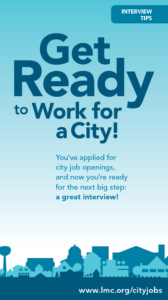Help job seekers be ready to work for your city by preparing them for a great interview!
Interviews are opportunities to showcase skills, experiences, and personality as candidates show potential employers why they’re the best fit for the job. Below are tips to help applicants prepare before, during, and after the interview. You can also print a version of the job seeker handout by clicking the brochure cover on this page.
Preparing for the Interview
Know the city.
Learn about the city’s projects and history, review their website, and take some time to explore the city before your interview.
Plan your route in advance.
Be sure you know what building you’re going to, what door to use, and who you should check in with when you arrive. Could parking or traffic be an issue? Plan your route and make sure to arrive 10-15 minutes early. Never, ever be late.
Prepare questions to ask interviewers.
You’re prepared to answer questions, but make sure you’re also prepared to ask some! Not only will you get to know the position and the city better, you’ll also show your interviewers how interested you are in the job.
Be ready to show your skills.
Bringing a portfolio or examples of your work. Practice how you will highlight the skills your work demonstrates. Even better? Create a “leave-behind,” condensed version to help the interviewer remember you and your work.
Dress for the job.
Dress at least as professionally as you expect your interviewer to be dressed, and remember: it’s better to be overdressed than underdressed.
During the Interview
Listen and communicate.
Listen carefully and have a positive attitude. Take a second to think about your answer—taking time to understand the question will help you keep your answer focused and on-topic. Remember that not all communication is verbal.
Show your personality.
Speak with genuine enthusiasm for what you do, and show confidence by making comfortable eye contact with everyone in the room. Be authentic. Try to relax, and have fun!
Virtual Interviews
You will likely use a laptop or desktop computer with a webcam and be invited by the city through a unique link to Zoom, Microsoft Teams, Cisco WebEx, or another platform. Find a quiet, private, and well-lit place free from possible interruptions. Test your technology in advance to ensure your webcam and audio are working. If possible, use the same technology that you’ll be using during the interview to practice. During the virtual interview, close any unnecessary web browser tabs and applications. Use headphones with a built-in microphone or headphones and a separate microphone.
Recorded Video Interviews
In this type of interview, the city will provide instructions on how to join the interview and will likely use a smartphone, tablet, or computer with a camera. Instead of being connected with a person, you’ll be prompted to answer questions that have been pre-recorded or appear in writing on the screen. You’ll record your answer to each question, and the employer will review the recording later. There is often a time limit for your answers, and you may be given more than one chance to record each answer. Be sure to record in a well-lit, comfortable space free from distractions. Have a friend video chat with you around the same time of day your interview will be held to ensure you can hear, be heard, see, and be seen.
After the Interview
Send a thank-you note.
As soon as you can after your interview, send a simple thank-you message, either by email or postal service, to your interviewer(s).
Follow-up on anything left unanswered.
Did your interviewer ask for any information that you didn’t have? Follow up right after your interview with the missing information.
Rejection?
Not every candidate can get the job, but it’s important to leave a good impression whether or not you are hired. Accept rejection professionally, and remember: You might apply to future jobs with the same city.
Choosing the Right Job
Consider the culture and characteristics.
The culture of an organization is an important aspect of every job. Look for an employer that appeals to your personality and goals. City governments vary in size, services provided, priorities, and resources. Research the organization and ask questions in the interview to learn more.
Compare salary and benefits.
Do your research and base your expectations on industry standards for your location, your experience, and your field.

